Lire cette interview en français
Élodie Picard met and married her husband Paul in France, but his career in the French military and with international peacekeeping organizations took them to the US, Tajikistan and now Austria. She and the children have often been separated from Paul as he has traveled to other countries, where he has sometimes spent months at a time in dangerous conflict areas. Raising three children in several countries and in unique circumstances, Élodie has learned to draw her family close and rely on the Lord in times of separation, isolation, illness, and danger.
Your family has lived in very different parts of the world because of your husband’s job. Where do you currently live?
We have lived in Vienna, Austria for three years now. Paul has worked for the OSCE (Organization for Security and Co-operation in Europe) since 2009. Before Austria, we were in Tajikistan for three and a half years.
Let’s talk about your years in Tajikistan. How was it to be a member of the Church there? How did you live and teach the gospel in your home? If I understand correctly, Christianity is a minority there.
Yes, it’s primarily Muslim, the Church wasn’t recognized nor legal, so we didn’t have the right to proselyte, even among the international community, we weren’t even allowed to give out a Book of Mormon. If people were interested because they saw that we were a little bit different –at each party at the Embassy we didn’t drink, so that quickly brought up questions – if ever there were some who were interested, we had to tell them that once they had returned to their country of origin, they could contact the missionaries. So, for the Church meetings, we would have them at our home in our living room, with windows closed so the prayers and songs wouldn’t be heard. We had been warned by the church lawyers: they didn’t want there to be stories of people who were members who didn’t respect the law when it came time for the possibility of opening the Church in these countries that were still closed.
So the law is that you can’t practice another religion, or just that you mustn’t show it?
There is a nondenominational Christian church that could meet, but our own church was not recognized, or registered or legal, so legally we weren’t allowed to hold our own meetings. So it was family. And then American students would sometimes come to study Tadjik Farsi (because they couldn’t travel to Iran), and they would come to our home. Officially we would invite them to dinner – so we’d have our meetings and then they would stay to dinner, and voila.
Then, during some of our last months there, we had a true miracle. Our children would complain that there were never any other kids, and Eva (the oldest) always prayed for there to be another family of members who would come with kids – there was a very slim chance of this. Then an American family arrived with four kids! So that was enormously joyful, and by the way, that was the first time that we had to buy Sunday shoes because we never wore them! Every other Sunday we would alternate going to their home and then they’d come to ours.
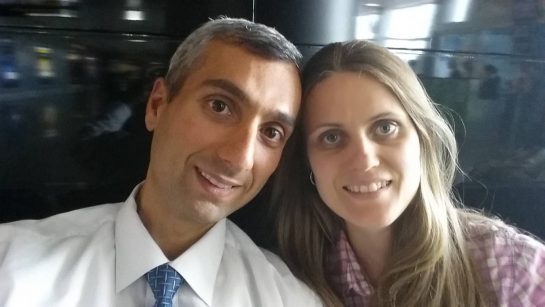
Élodie and her husband Paul
We would just do primary, the hymns –I was primary president and my husband was the music conductor—and then we would have the sacrament and we would do a talk, either Paul or me. Every Sunday. So, when we had a student who would come, we would ask him or her, “Do you want to give a talk?” (laughs) We did that for three and a half years. And when we came back to Europe, our first Sunday was in Vienna with this enormous organ, and when they started to play the organ and all these voices united together, we were moved to tears. We had sung a capella for so long, with three little children’s voices and two adult voices, so it was a moving experience.
We had some beautiful experiences. For baptisms it was the same, we had our son who turned eight there, and he had to wait to come back to France to get baptized, because we couldn’t do it there.
Did you speak the language at all, or were you with other foreigners? What was life like for you from day-to-day?
I made do, to be polite, to make purchases, to do things. Some of my Tajik neighbors spoke English more or less — specifically those in the home where we lived. It was a twin home we shared with our Tajik landlord who lived with his wife and two kids and their families (there, everyone lives under the same roof).
So, I didn’t become too close to the international community, simply because of Paul’s job. When there were receptions, etc., I would go. But me, I was a little different from the other women there who generally had careers, who had a cook, a cleaning lady, a full-time nanny, and so I was a little different as a stay-at-home mom. I did home school, my kids didn’t go to international school…so, that made it so there were many things that caused them to look at us a little differently. So in the international community, I really didn’t have a lot of friends.
However with the locals, yes. I was outside with the kids, and so were the other women, so the kids played together; they spoke a mix of Tajik and Russian, like the local children there, so I’d say I was closer to the local community than the international; and it was also intentional. I prefer when I am abroad to integrate myself with the local people than to blend in with the foreigners.
It was also tricky because their situation was particular; they are a very poor people, and so I had to be close without being too close, seeing as we don’t have endless financial means and that can quickly create conflict. So, we would often help, but in anonymous ways, so that people wouldn’t be constantly in front of our door asking. That was my first mistake in the first house we rented: I helped out some people, and all day long the door rang asking for something to eat, anything. Well, you can give, but you can’t all the time! So, Paul warned me and when we moved: “Never give out anything from home. When you are in the street and people don’t know where you live, you can be generous, but in your home you simply cannot.”
I imagine that there were some pretty bizarre exchanges also, some moments of culture shock. I remember one incident in particular with a goat for a festival…
Ah yes, the sheep…it was for the birth of our landlord’s grandson. In Tajikistan, it’s the custom when an infant has lived one month, and then when he has lived a year –because there are many deaths in infancy there– you thank God by killing a sheep in the traditional way: you empty its blood completely, then take out its intestines, you suspend the animal by the hooves… there’s a whole process. It was our oldest’s birthday, and our kids really like animals, so they heard the sheep in our yard (because it was a shared yard with the houses that faced ours), the kids were so happy saying, “Oh mommy there’s a sheep! There’s a sheep!” They were overjoyed. And then, I saw the landlord approach us with his son and an enormous knife, and I instantly understood. I said to the kids, “Get away from the window.” “Oh no mommy!” And we started to hear the cries of the struggling animal. They suspended the animal by its back legs and they cut its throat. There was blood everywhere in the yard. They emptied it, prepared the meat, and cooked it, and then they came to share their meal with us.
That was a little bit of a strange experience! You know, us, in our culture, we’re used to things being sterilized and from the grocery store: it’s already all cut up. There, they literally saw the sheep ripped open in the courtyard, it had its eyes open and tongue hanging out, and it was unforgettable. But Jerome, our son, it didn’t bother him much. He said, “Ah well, he’s dead.” Lynn, who was little, was very curious, and Eva was very angry, very sad, and she said, “I will never talk to the neighbors again! I will never forgive them!” But when they brought the plate of meat, she was the first to eat it! (laughs)
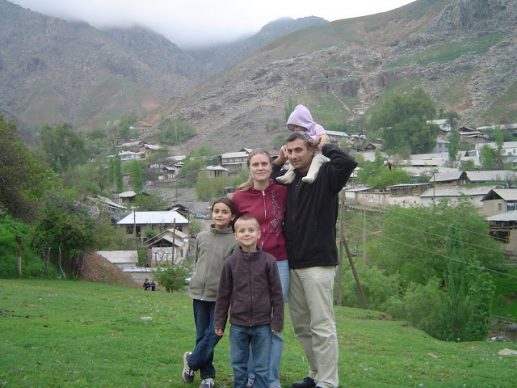
Élodie and her family near a village in Tadjikistan
We had to pay attention to not give too much advice, because they lived not only in a simple manner but also as if from another era. Once there was a lunar eclipse, and they had to chase away demons so that the moon would reappear. And so it was pretty impressive, because when the moon disappeared, all of a sudden we heard everyone bang their pots and pans with big spoons, they yelled and sang while watching the sky; they were always a little full of superstition. Me, I wanted to explain to them that it was going to reappear, they just had to wait a few minutes! But when the moon reappeared everyone said, “Ah, praise be to God.” They started doing all their prayers. So, it was a little like living in another time.
Was it difficult staying close to the Lord when you didn’t have a church community, and when you were surrounded by people who didn’t necessarily have the same beliefs…How was that experience?
First, that made it possible for me to learn about other faiths, and to see that there were people who lived their faith in a very beautiful and very holy manner, and really I admired it very much. I met some Christians who had left everything to come to that country to bring Christianity and teach of Christ, and they served in a beautiful way. There was one American family, he was an ophthalmologist and could have earned a good living in the United States, but he came there, they really lived in poor conditions, and he taught ophthalmology for free there, and he also took any opportunity to teach about Christ and the Bible. And of course I met Muslims who were very faithful and who lived their religion in a way that actually is very similar to ours. They focused on others, on service, they honored God, and actually we had lots of things in common- which I also appreciate. So, we traded. They would do Ramadan and we would do fast Sunday and then we would talk about it. Paul also practiced Ramadan for a month! So, I mean it when I say that it was really a rich experience.
On a family level, it brought us closer than ever. Paul was often gone on missions for the Army before we moved to Tajikistan, which meant it was only our little family unit during all these months in a row, which really bonded us closer, I believe. Plus, the kids were able to grow up listening to their parents share testimonies regularly, at least every week! (laughs)
When it comes to faith, what I missed, and what I hadn’t realized before, was the visiting teachers, the home teachers; the fact that sometimes we could chat, count on each other. During the winter Paul would sometimes leave for several weeks way up in the mountains and he couldn’t come home. In these cases we no longer had the Priesthood, so no more Sacrament either. I really felt how much was lacking from Sundays. That’s why Sunday in this church is for taking the sacrament. It’s the most sacred time, the most solemn and the most important part of the Sabbath day. And when I didn’t have the sacrament, after three weeks or a month, it was really hard. I felt in serious need of replenishment. And I had never felt that before not having it.
Now you live in Austria and the way of life is obviously very different. What are some of the joys and difficulties of perpetually living abroad?
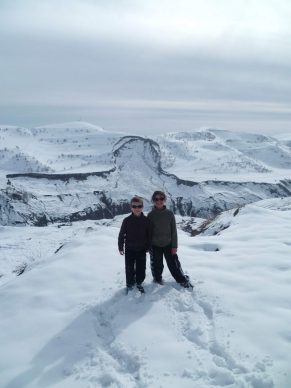
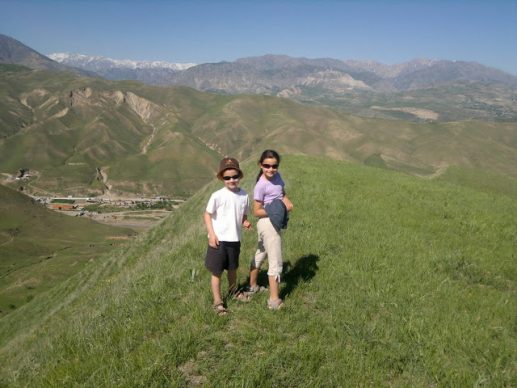
Life in Tajikistan was very simple. There weren’t extracurricular activities everywhere, even the capital is a quiet, small city, and they really live by the rhythm of the seasons. Meaning, in developed countries we forget that it’s winter, fall, spring and summer…there, in fall and winter, there is nothing left in the stores, nothing left in the markets, and when spring arrives and you find all these fruits and vegetables that come out of the earth once again it is truly joyful. Our first winter, I didn’t know that there would be nothing! We survived on potatoes, carrots and onions, which kept well in the cellar for a long time, and which you could still find at the market during the winter, but that’s all. So after three months like that, the joy when we went to the market and saw cucumbers, tomatoes, herbs…the children literally shouted with joy! After that, potatoes, carrots and onions, we didn’t eat them again for six months! (laughs) We’d had it! And then there, when it’s winter, it’s cold. You can’t properly warm up. The electricity goes out constantly so the heating doesn’t work…Really, you are in survival mode. You wait for the first warm days and the first plants to grow. It’s a beautiful experience to have, in the sense that you really live like I think the people of olden times lived, in cycle with nature. And that allows you to appreciate a little better everything that we forget in our culture.
After that, what I appreciate here is of course drinkable water from the faucet — that makes life easy! By the way, one of the first things that we did when we got here was take a shower with our mouths open! (laughs) After that, obviously I appreciate that there is the Church. It’s important for us, I appreciate being able to serve in the Church. I missed being able to do that. For the children, I appreciate all that is offered here with the extracurricular activities, museums, the pool, the library, all the things that we didn’t have there.
But the children, you know, they say regularly that they would really like to go back to Tajikistan. They really liked it. Every Sunday we would do our Sunday Adventure, so after the meetings, we would take the four wheeler and we would leave. Ten minutes from downtown, you are in the mountains! So we would drive, we would go to the top of the mountains, we would stop and let the kids run. They would run after the wild horses, the wild sheep, the grasshoppers…When it was snowy, they would roll to the bottom. They were in harmony with nature, which was nice. Of course as children, for them, it was paradise. As an adult, there are all the worries of how am I going to feed them, when am I finally going to have electricity to get the machines working again, oh no, I almost don’t have any drinkable water left, I’ve got to find a way to get some…all the little details.
How have all these experiences influenced your relationship with Heavenly Father, and also your sense of personal worth? I know that you have had to make sacrifices for your husband’s career that were not always easy, and that there have been challenges when he has been gone.
Yes, last year he was in Russia for a year on the border of Ukraine, and on the other side, facing him were the rebels! And then he came back in July, he had been gone 15 months. There, we couldn’t follow him because it was dangerous. But how do I handle all of this? First, I find that it’s very enriching. We have been married 16 years, and we have lived in France for only one of these 16 years. What I appreciate is that I think we have very open minds; after everything that we have come across in cultures and ways of life, ways of raising and educating children as a mother–to see the differences between the Tajiks or the Austrians or the Americans or the French… With time, you realize that we all want the same thing. We want freedom, we want our family to have opportunities and to be in good health, and to be happy. In every culture, no matter the religion or the people, it’s always the same thing. Yet, there are still ways of getting there that are different. In certain cultures, having a good job and a good salary is all that counts because it’s what they think brings happiness and opportunities for their family. In other cultures, money and work aren’t as important, what is important is health, having enough to eat, having a roof over your head.
As a daughter of God, it’s really that that I felt. It’s that people aren’t different in God’s eyes. He loves and blesses each one of his peoples. Your relationship with Heavenly Father can be different because you are Muslim or Christian, and there are even people who don’t believe in God, but still I know that He is there and He helps them and He listens to them and He knows what they are going through.
It’s beautiful to see, and I think I really learned to accept truth and goodness everywhere, no matter where it comes from. I didn’t have that notion of, “Oh, I am a member of the Church, the true church of Jesus Christ, so I know better or maybe more than others.” Not at all. For me, it’s really the opposite. I learn much from others and their way of doing things. Certainly there are things that I’d look at and say, “That? Never!” (laughs) and then there are other times when I’d say, “Now that’s great!” and I try to add a little of that to my way of living and my children’s also! My kids have a beautiful richness; I see that they have already grown up on three different continents, and they communicate with many different languages. It doesn’t matter what park I take them to, they make friends–whether or not they speak the language, it’s great! And I also know that they are slower to judge. Jerome tells me all the time, “You know mom, we don’t know how they’re educated. We don’t know. We’d better not judge.” He knows that for certain people, that’s normal.
On top of that, as a mom, it’s also a little hard because sometimes they do certain things that I know in our French or European culture wouldn’t be acceptable, so I try to raise them the French way, even while not living in France, but it doesn’t always work out perfectly! For example, in Tajikistan, they had learned to spit everywhere, whenever, because there everyone spits and it’s normal–in the street, all the time! And I would tell them, “No, we cannot spit, we’ll go back to Europe and we don’t spit like that!” It was a pain! Well, it’s not things that are essential to their salvation, but… (laughs) That’s what I tell myself.
You had difficult pregnancies, sometimes where you couldn’t have Paul by your side, and I remember a while ago you told me that you had found it to be a spiritual experience, that you had to cling more to Heavenly Father. It seems to me that in the end, that applies to many of the experiences that you’ve had with your family.
I think that Heavenly Father intervenes in our lives when He must intervene. But certain times, He won’t intervene because there are other solutions. If, for example, medically, I can receive the treatments that I need in the country I’m in, I must go and seek out those treatments. If I was abroad, and I didn’t have access to a specific treatment I needed, what would happen is, it was really faith and the miracle of the Priesthood that saved us—more than one time. And in those moments, I really noticed and felt that the Savior and Heavenly Father, they want to help us. But they also want us to do our part. So, if our part is in another country where it’s possible, it’s up to us to go get a consultation and get the care we need. He is not going to perform a priesthood miracle in that kind of case, where it’s not exactly necessary. Many times, I have no doubt that He was very present, and that He knew that it was Him or it was nothing else.
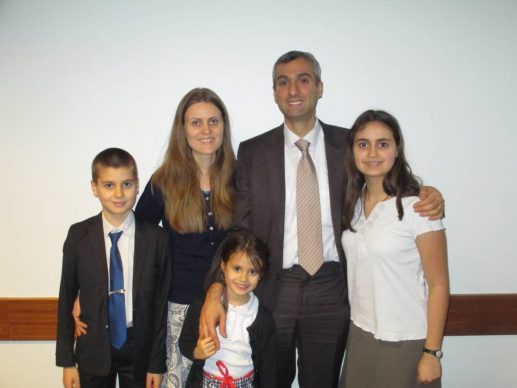
Élodie, Paul, and their children
There were certain people who, when we decided to leave for Tajikistan and take this job, would say to me, “You can’t, you have young children!” I left with a two-month-old baby who was born prematurely, and the other kids were still young. People would say, “How are you going to do it?” and I really left with the assurance that we had prayed, that we had felt that this was what we should do, and I knew that He would help us. And indeed He did, because when we were in Tajikistan, we had come home to France again on vacation and it was during our weeks there that we discovered that I had thyroid cancer. And that happened at the exact moment when it should have. If I had been in Tajikistan, I wouldn’t have been able to figure out what was happening. I would not have been able to understand it, analyze it, do the biopsy and then what followed.
Then, when Paul was in Russia last year, it was the same thing: we got down on our knees and felt that we should accept this job, and that it would be good for us, for him, and that he would be blessed and protected. So, we still do that, and I always leave with the feeling of much love, faith, and peace, because even if there is something bad that happens, it’s because it is His will. From the moment that I have this assurance, we do it, and each time it has been like that. He left many times for Afghanistan, he went to Kosovo, and there he was with the crisis in Ukraine, so it was always done with much prayer. And once he left, I didn’t worry. I only worry when he calls and tells me, “You need to worry!” (laughs) That has happened twice, and when it’s like that, I stay on my knees all night, until he calls me back the next day to tell me that all is well. And that is how we overcame all that.
So obviously, when a couple is separated, that’s when you discover — you know, in the church we always say that in marriage there is the husband, the wife, and the Lord, the triangle with the Lord at the top, –I believe that when we are separated like that, it’s really at that point that we feel there are really three of us, not just two. And my relationship with Heavenly Father and my Savior is inevitably stronger and more intimate when I am separated from Paul. When Paul is there, I feel that I already have my support, my best friend, the one who understands me…When he’s no longer there and I can’t have him constantly, I turn myself more toward God, my Savior, and my prayers are always richer and more abundant.
At A Glance
Name: Élodie Picard
Age: 35
Location: Vienna, Austria
Marital History: Married
Occupation: Stay at home mom, homeschooler
Education: BA in Psychology from Victor Ségalen Bordeaux
Languages spoken at home: French
Interview Produced by Lydia Defranchi, Translation provided by Haleigh Heaps Burgon
